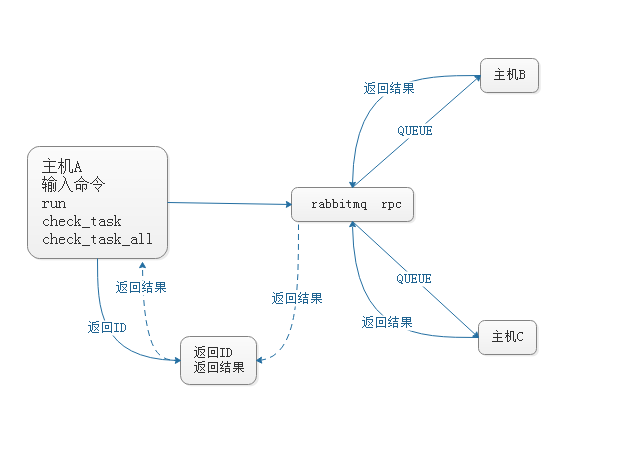基于RabbitMQ rpc实现的主机管理
可以对指定机器异步的执行多个命令
例子:
>>:run "df -h" --hosts 192.168.3.55 10.4.3.4
task id: 45334
>>: check_task 45334
>>:
注意,每执行一条命令,即立刻生成一个任务ID,不需等待结果返回,通过命令check_task TASK_ID来得到任务结果
基于rabbitmq的rpc,输入执行命令,直接返回ID,进入到rpc中,通过指定的IP地址建立socket,建立queue(“rpc”) 然后执行命令,返回结果,返回的结果和id组成字典,输入ID就可以查看结果
测试:在windows下
备注:本实验在windows下进行的所以在执行命令是要使用windows的命令


1 import pika 2 import subprocess 3 4 connection =pika.BlockingConnection(pika.ConnectionParameters(host="localhost")) 5 channel = connection.channel() 6 channel.queue_declare(queue="rpc") 7 8 def command(cmd): 9 res = subprocess.Popen(cmd,shell=True,stdout=subprocess.PIPE,stderr=subprocess.PIPE) 10 # print(res) 11 msg = res.stdout.read().decode("gbk") 12 print(msg) 13 return msg 14 15 def on_request(ch,method,props,body): 16 cmd = body.decode() 17 response = command(cmd) 18 ch.basic_publish(exchange="", 19 routing_key=props.reply_to, 20 properties=pika.BasicProperties(correlation_id=props.correlation_id), 21 body=response 22 ) 23 ch.basic_ack(delivery_tag=method.delivery_tag) 24 25 channel.basic_qos(prefetch_count=1) 26 channel.basic_consume(on_request,queue="rpc") 27 print("Waiting RPC requests") 28 channel.start_consuming()

1 import pika 2 import uuid 3 import random 4 5 class Client(object): 6 def __init__(self): 7 self.connection = pika.BlockingConnection(pika.ConnectionParameters(host="localhost")) 8 self.channel = self.connection.channel() 9 10 result = self.channel.queue_declare(exclusive=True) 11 self.callback_queue = result.method.queue 12 13 self.channel.basic_consume(self.on_response,no_ack=True,queue=self.callback_queue) 14 15 def on_response(self,ch,method,props,body): 16 if self.corr_id == props.correlation_id: 17 self.response = body 18 19 def call(self,command,host): 20 self.response = None 21 self.corr_id = str(uuid.uuid4()) 22 self.channel.basic_publish(exchange="", 23 routing_key="rpc", 24 properties=pika.BasicProperties(reply_to=self.callback_queue,correlation_id=self.corr_id,), 25 body=str(command) 26 ) 27 while self.response is None: 28 self.connection.process_data_events() 29 30 self.corr_id = random.randint(10000,99999) 31 id = self.corr_id 32 res = self.response.decode() 33 dict[id] =res 34 print('task_id: %s host: %s cmd: %s ' % (self.corr_id, host, command)) 35 return self.corr_id, self.response.decode() 36 37 def help(): 38 print("run 'df -h' --hosts 127.0.0.1 10.10.10.1") 39 print("check_task id") 40 print("check_task_all") 41 42 def start(command_input): 43 command_list = command_input.split() 44 if command_list[0]== "run": 45 try: 46 obj = command_input.split("run") 47 host_obj =obj[1].split("--hosts") 48 hosts = host_obj[1].strip().split() 49 command= command_input.split("\"")[1] 50 for host in hosts: 51 try: 52 rpc_client.call(command,host) 53 except TypeError and AssertionError: 54 break 55 except IndexError: 56 print('-bash: %s command not found' % command_input) 57 help() 58 elif command_list[0] =="check_task": 59 try: 60 print(dict[int(command_list[1])]) 61 except IndexError: 62 help() 63 elif command_list[0] =="check_task_all": 64 for index, key in enumerate(dict.keys()): 65 print(index,key) 66 elif command_list[0]=="help": 67 help() 68 else: 69 print('-bash: %s command not found' % command_input) 70 help() 71 72 73 rpc_client = Client() 74 dict={} 75 help() 76 while True: 77 command_input =input("请输入命令>>>:").strip() 78 if len(command_input)==0: 79 continue 80 else: 81 start(command_input)


